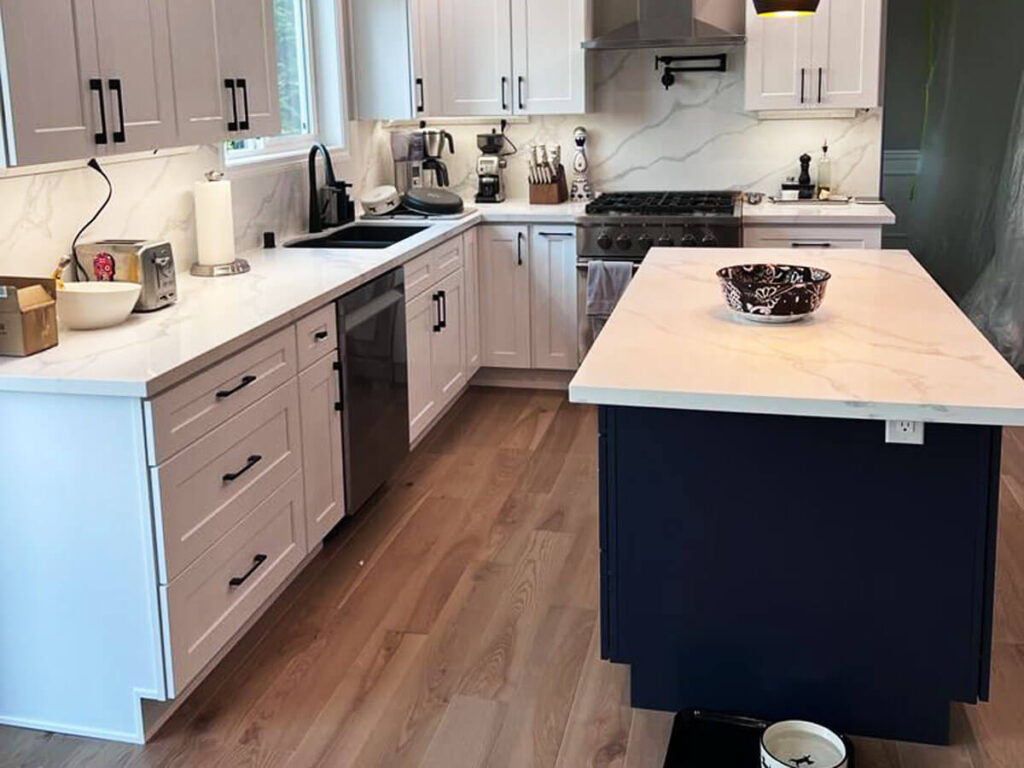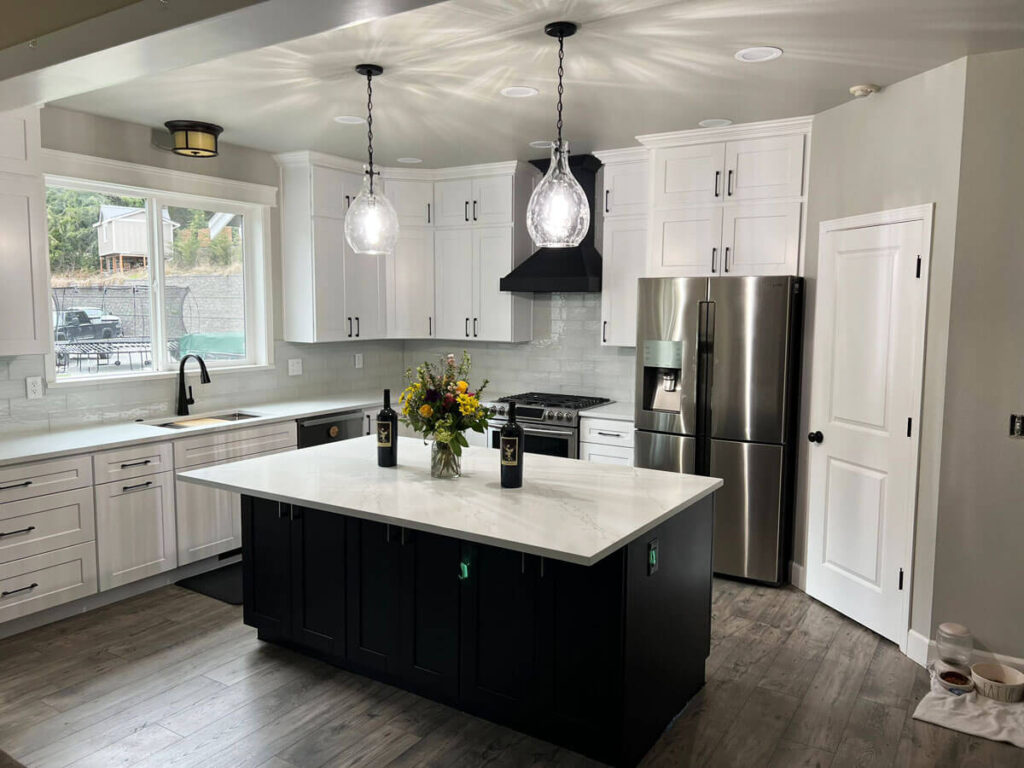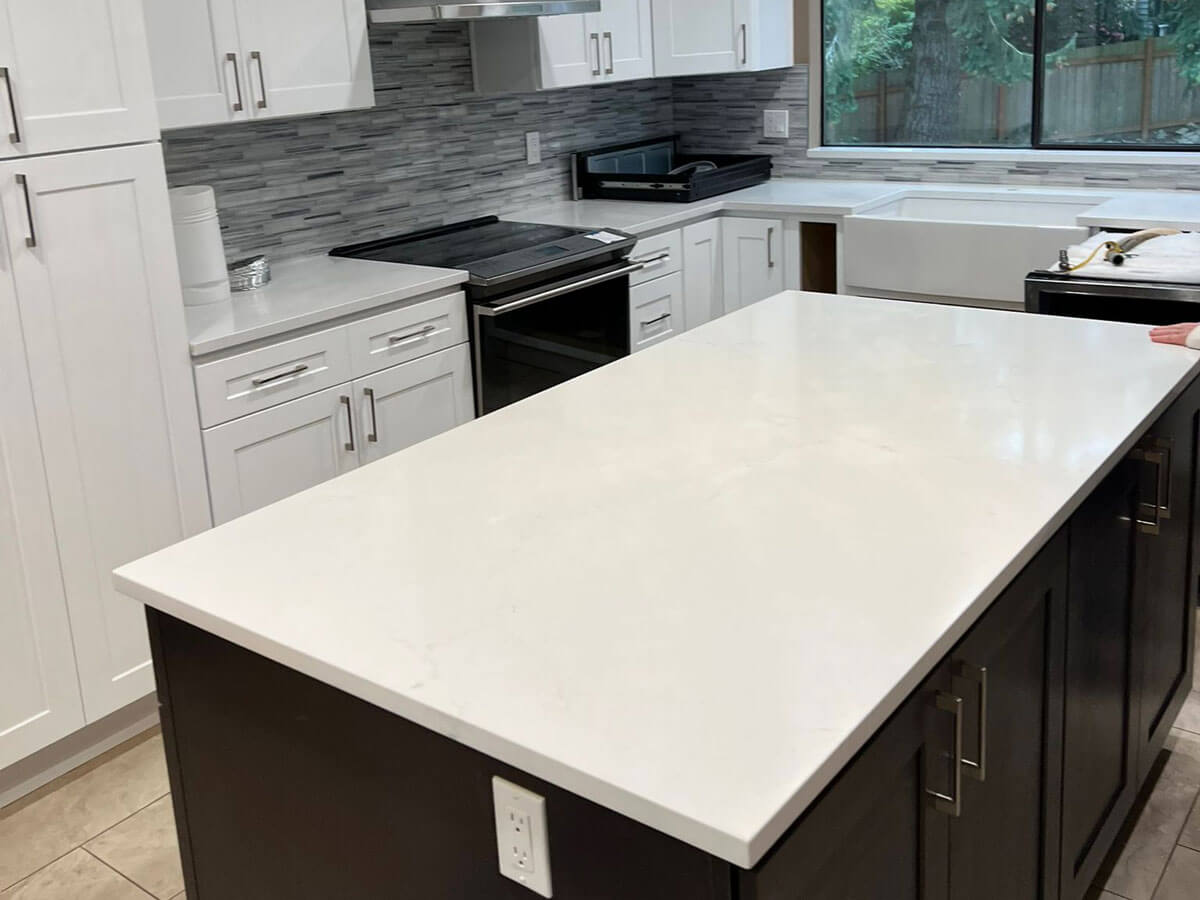Quartz is a common yet stunning crystal made of silicon dioxide. It is also a popular material for kitchen countertops, often appearing in the form of engineered stone. Without much ado, let’s delve into the benefits of quartz countertops and why they make for a great upgrade for your kitchen.
What Are the Benefits of Quartz Countertops?
Here’s a fun little trivia: quartz countertops are not fully made of quartz. Pure quartz can be hard to work with, so it is often broken down and combined with a resin binder to achieve the desired shape. Regardless, quartz kitchen countertops are a popular choice for Renton homes. The material offers a number of benefits, including the following:
1. Great aesthetic appeal

Quartz is simply a beautiful rock. Combining it with resin into an engineered stone countertop does not take away from its appeal. Rather, it enhances the material and gives it a high degree of versatility in terms of color and design. Manufacturers can add pigments that improve the color, or arrange the quartz pieces into a wide variety of visually appealing patterns.
2. High durability
Quartz countertops are known to be water-resistant and not vulnerable to water damage. The natural quartz component alone is non-porous and does not dissolve in water. The resin, meanwhile, fills all the gaps between the quartz and provides an additional waterproof layer.
That aside, a high-quality engineered quartz kitchen countertop is strong and built to last. It is also hard and not easily scratched or punctured. It can also resist heat up to 150 degrees Fahrenheit, above which it may start to discolor.
3. Hygienic qualities
The non-porous quality of quartz countertops also aids in the homeowner’s health and hygiene. As nothing can virtually get under its surface, molds and mildew cannot grow in it. The same goes for bacteria, although they may thrive on uncleaned surfaces.
4. Cost-effectiveness
A quartz countertop is cheaper than most natural stone countertops, costing somewhere between $60 and $100 per square foot. This is thanks mainly to the accessibility of the components and the manufacturing process. Quartz is a widely available mineral, comprising about 20% of our planet’s crust. Furthermore, the manufacturing process is not complex—the stone is merely crushed, bound by resin, and cut into the desired shape. This is also less expensive than having the stone cut into perfectly shaped slabs by a skilled artisan.
5. Ease of maintenance
Engineered quartz kitchen countertops tend to have smooth, flawless surfaces. This makes the surface resistant to stains and easy to clean. For the more stubborn dirt, you only need a simple solution of soapy warm water and a clean towel. If you can avoid putting very hot items on the counter, you won’t need to worry about ruining your countertop.
6. Versatile material
Manufacturers can produce quartz countertops in a wide variety of colors, patterns, and designs. It’s even possible to place bespoke orders that closely follow your specifications. Engineered quartz slabs are simply easy to work with, and these countertops can be installed in practically any part of your home.
7. Home resale value improvement
A quartz kitchen countertop is a cost-effective way to increase your home’s resale value. While it’s not as luxurious or as durable as natural stone, many buyers find engineered quartz just as attractive. How much it adds to your home’s resale value is debatable, but it certainly improves your property’s appeal to buyers.
How Long Do Quartz Countertops Last?

An engineered quartz countertop can last for at least 20 years, often ageing more gracefully than some of its natural stone counterparts. With proper care, it can last anywhere between 30 and 100 years—that’s practically a lifetime!
So, how do you maximize the longevity of your engineered quartz countertop? Here are some useful maintenance tips:
- Do not expose your countertop to high heat. Quartz countertops can generally manage temperatures of up to 150 degrees Fahrenheit. Exposure to higher temperatures can result in discoloration, though it can still remain intact at temperatures up to 300 degrees. Any higher and warping and breaking can result, as the heat starts changing the resin binder’s chemical state. Avoid placing hot objects—like pans straight out of a stove—directly on the surface to prevent heat damage.
- Do not expose it to harsh chemicals. Strong cleaning solutions like acetone, ammonia, and bleach can dull and damage the countertop surface. These chemicals react with the resin, weakening the bond and making your countertop more susceptible to damage.
- Do not subject it to strong impacts. Quartz countertops are designed to withstand day-to-day kitchen activities, but they’re not indestructible. Take care not to drop heavy objects on it or use it as a chopping board.
- Regularly clean your countertop. Routine cleaning maintains your countertop’s finish and keeps it sanitary. You don’t need to go over the top here; a soft rag soaked in a soapy water solution usually does the trick.
What Is the Downside to Quartz Countertops?
For sure, a quartz countertop makes a good addition to any home. However, it does not come without a few drawbacks. These cons include the following:
- Expensive installation. While engineered quartz balances cost with durability and easy maintenance, the material is more expensive than the more common granite. Additionally, it requires precise installation by professional builders.
- Vulnerable to heat damage. Although quartz can withstand high heat, its resin binder practically burns at high temperatures, causing brittleness and warping at prolonged exposures.
- Not suitable for outdoor use. The presence of resin polymer binders causes quartz countertops to dull or yellow after extended exposure to sunlight. This makes it unsuitable for outdoor installations.
- Noticeable seams. Engineered quartz slabs may need to be cut up for easier transport, and these seams easily show in lighter colored countertops. The caulking at the joints would especially make these seams more obvious.
Final Thoughts
The benefits of quartz countertops don’t stop at their inherent beauty. They are strong, durable, and can last for many years. However, it is also important to note the limitations of the engineered quartz and its specific care requirements.
Understanding of its strengths and sensitivities will help you provide adequate care to your countertop, allowing you to enjoy this stunning centerpiece for what could possibly be a lifetime. Whether you’re upgrading a kitchen in Seattle or remodeling a bathroom in Renton, quartz can provide lasting style and functionality for your home.

